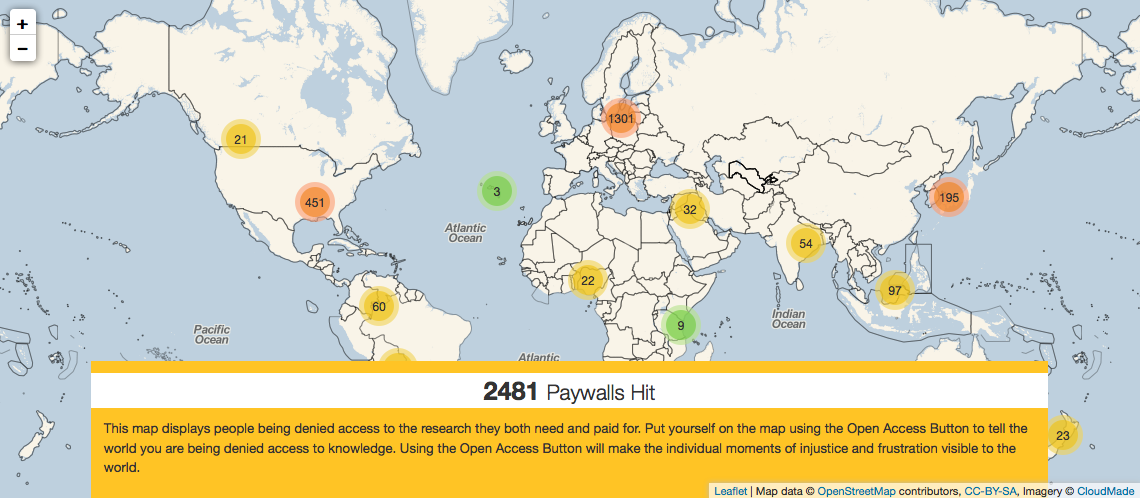This guest blog post was written by David Carroll, Open Access Button Project Lead
Earlier this month, as I sat at the Wikimania Open Data Hack in the Barbican, silently whirring in the back of my mind was an impending anniversary. It had been one year since the first line of code of what would later become the Open Access Button was written. The surroundings themselves were not dissimilar, a year earlier we were a little way across the city of London at The BMJ’s hack weekend and it was there we found an incredible team of developers to make the Open Access Button Beta a reality.
The motivation for building the Open Access Button came just a few months earlier, when in March 2013, Joe McArthur and I learnt that people are systematically denied access to research every day. hen we learnt this, we wanted to do something about it. Over the following months, we worked every second of our spare time with an amazing team of volunteer developers and in November 2013 we launched the Open Access Button.
The Button is a browser bookmarklet that allows users to report when they hit a paywall and are denied access to research. Being denied access to research is often an invisible problem and through the Button we aim to make the problem visible, collect the individual experiences, and showcase the global magnitude of the problem.
So far we’ve tracked and mapped over 8,700 paywalls since the launch. These paywalls represent 8,700 times that scholars were denied access to research in their field students couldn’t access additional sources for their thesis, or doctors couldn’t read the latest medical research. The stories collected so far are just the tip of a large iceberg of those being denied access to research.
The Button that currently exists at openaccessbutton.org is only a example of what we want to do in the future and since November, we’ve been working hard planning for the future of the Button and building a global, diverse student team supplemented by a professional steering committee to help us make the future Button the success.
Recently, we announced a partnership with Cottage Labs to further develop the Open Access Button. They will work on development of the Open Access Button, in addition to providing hardware and sysadmin support. In addition to re-building the Open Access Button, we’re also working with Wikipedians on the Signalling OA-ness project. This tool works is that when someone is making a citation, they can use the “Signalling OA” tool. This tool will be used to signal the “openness” of citations on Wikipedia, with the main purpose of this would be to spare readers the disappointment of clicking through to the resource only to find out that they cannot access it. It will also be useful for Wikipedia editors to see if citations are licensed in a way that allows for the images, media or even text to be reused in Wikipedia articles. We’ve been working on this recently and our contribution to this project should be ready by Wikimania next week.

The collaboration with Cottage Labs is provided in kind to build core functions of the future Open Access Button and to drive us forward but this in kind support is just for the core functions, to achieve everything we want to achieve and more, we still need your support.
The Open Access Button Beta was built with the support of the Open Access Community and a small team of incredible developers who worked with us on a volunteer basis because of their dedication to Openness and as we develop the future Open Access Button, we want that community spirit to continue. If you’re a developer committed to Openness in your work wanting to lend a hand, find us at Github and if you’re a publisher, a library, an organisation or an individual committed to opening up knowledge for all get in touch. If you can offer financial support, in kind support or just some helpful words of advice, we would love to hear from you. With your support, we can meet our goals and launch the best button we can and continue to make the problems of paywalls impossible to ignore.
As we work towards the next launch, we are going to continue collecting data and user stories in order to advocate for open access. If you’re hitting paywalls, don’t be silent, download the Button at openaccessbutton.org and report each time you’re denied access to research.
To stay up to date on the progress of Button, you can follow us on Twitter, like us on Facebook, read our blog or email us at openaccessbutton@medsin.org.





